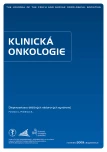-
Medical journals
- Career
Limitations of Genetic Testing in Oncology
Authors: L. Foretová 1; M. Navratilova 1; E. Macháčková 1
Authors‘ workplace: Oddělení epidemiologie a genetiky nádorů, Masarykův onkologický ústav, Brno 1
Published in: Klin Onkol 2009; 22(Supplementum): 65-68
Overview
Genetic testing of cancer syndromes is based on the existing knowledge of monogenic causes of oncologic diseases. In cases of high risk genes, the findings concerning the carrier status of pathogenic mutation can be of clinical use in the prediction of risks and for preventive care. In non carriers in families with mutation in the high risk gene, the risk of cancer diseases may not be the same as the population risk and some preventive follow up is recommended. The clinical use of genes with mild or moderate risk of cancer is problematic and could lead to distorted conclusions about the actual cause of the familial form of the disease. Predictive testing in genes with moderate risk of cancer (2 – 3 times) is not offered, or the non carriers are followed in the same way as carriers. The use of genes with mild risk is not recommended in clinical practice. Molecular genetic testing also has its limitations and its quality depends on the methods and technology used and the existing knowledge of the significance of mutations. In some variants it is not clear yet whether they are just insignificant polymorphisms or pathogenic mutations. The interpretation of test results in the context of the whole family history is important.
Key words:
genetic testing – mutations – genes
Sources
1. Claes K, Poppe B, Machackova E et al. Differentiating pathogenic mutations from polymorphic alterations in the splice sites of BRCA1 and BRCA2. Gen Chromos Cancer 2003; 37 : 314 – 320.
2. Collins FS, Brooks LD, Charkravarti A. A DNA polymorphism discovery resource for research on human genetic variation. Genome Res 1998; 8 : 1229 – 1231.
3. Cotton RGH, Scriver CR. Proof of “disease causing” mutation. Hum Mut 1998; 12 : 1 – 3.
4. Katki HA , Gail MH, Greene MH. Breast-cancer risk in BRCA-mutation-negative women from BRCA-mutation-positive families. Lance Oncol 2007; 8(12): 1042 – 1043.
5. Kleibl Z, Novotny J, Bezdickova D et al. The CHEK2 c. 1100delC germline mutation rarely contributes to breast cancer development in the Czech Republic. Breast Cancer Res Treat. 2005; 90(2): 165 – 167.
6. Krawczak M, Reiss J, Cooper DN. The mutational spectrum of single base - pair substitutions in mRNA splice junctions of human genes: causes and consequences. Hum Genet 1992; 90 : 41 – 54.
7. Miki Y, Swensen J, Shattuck - Eidens D et al. A strong candidate for the Breast and ovarian cancer susceptibility gene BRCA1. Science 1994; 266 : 66 – 71.
8. Rogan PK, Faux BM, Schneider TD. Information analysis of human splice site mutations. Hum Mut 1998; 12 : 153 – 171.
9. Smith A, Moran A, Boyd MC et al. Phenocopies in BRCA1 and BRCA2 families: evidence for modifier genes and implications for screening. J Med Genet 2007; 44(1): 10 – 15.
10. Strachan T, Read AP. Human Molecular Genetics. 2nd ed. BIOS Scientific Publishers Ltd. 1999.
11. Tailon - Miller P, Gu Z, Li Q et al. Overlapping genomic sequences: a treasure trove of single nucleotide polymorphisms. Genome Res 1998; 8 : 748 – 754.
12. Vašíčková P, Macháčková E, Lukešová M et al. Varianty neznámého významu a intragenová přeskupení v genech BRCA1 a BRCA2. Klin Onkol 2006; 19(Suppl): 58 – 62.
13. Walsh T, King MC. Ten genes for inherited breast cancer. Cancer Cell 2007; 11(2): 103 – 105.
14. Weischer M, Bojesen SE, Ellervirk Ch et al. CHEK2 1100delC genotyping for clinical assesment of breast cancer risk: Metaanalysis of 26 000 patient cases and 27 000 controls. J Clin Oncol 2008; 26(4): 542 – 548.
15. Wooster R, Bignell G, Lancaster J et al. Identification of the breast cancer susceptibility gene BRCA2. Nature 1995; 378 : 789 – 792.
16. Wooster R, Neuhausen SL, Mangion J et al. Localisation of a breast cancer susceptibility gene, BRCA2, to chromosome13q12 –
13. Science 1994; 265 : 2088-2090.
Labels
Paediatric clinical oncology Surgery Clinical oncology
Article was published inClinical Oncology

2009 Issue Supplementum-
All articles in this issue
- Hereditary Breast and Ovarian Cancer Syndrome
- Hereditary Nonpolyposis Colorectal Cancer (HNPCC, Lynch syndrome)
- Familial Adenomatous Polyposis
- Li-Fraumeni Syndrome
- Von Hippel-Lindau Disease
- Multiple Endocrine Neoplasia Type 1 Syndrome
- Multiple Endocrine Neoplasia Type 2 Syndrome
- Familial Atypical Multiple Mole Melanoma Syndrome – FAMMM
- Gorlin Syndrome
- Peutz-Jeghers Syndrome
- The Survey of Syndromes with the Risk of Cancer in Children Age
- Tuberous Sclerosis
- Hereditary Pancreatitis
- Cowden Syndrome
- Recommendation for Prophylactic Surgery for Decreasing the Risk of Gynaecological Cancer in Women with Hereditary Risk
- Current Methods in Diagnostics and Monitoring of Patients with Hereditary Polyposis Syndromes. Investigation of the Small Intestine
- Limitations of Genetic Testing in Oncology
- Prerequisites for Preimplantation Genetic Diagnosis (PGD) in Carriers of Mutations Responsible for Hereditary Cancers
- Commentary: Preimplantation Genetic Diagnosis
- Commentary: The Possibilities of (Assisted Reproduction Techniques) in Control of Risk Genes Transfer to the Offspring
- Commentary: Preimplantation Genetic Diagnosis
- Clinical Oncology
- Journal archive
- Current issue
- Online only
- About the journal
Most read in this issue- Hereditary Pancreatitis
- Gorlin Syndrome
- Multiple Endocrine Neoplasia Type 2 Syndrome
- Multiple Endocrine Neoplasia Type 1 Syndrome
Login#ADS_BOTTOM_SCRIPTS#Forgotten passwordEnter the email address that you registered with. We will send you instructions on how to set a new password.
- Career

